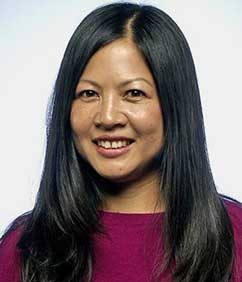Los Angeles Times Deputy Metro Editor Cindy Chang ’02 explains how a law degree has helped her journalism career
In 2019, Cindy Chang ’02, then a Los Angeles Times staff writer covering the Los Angeles Police Department (LAPD), noticed that the LAPD—unlike similar metropolitan police departments—didn’t report demographic analysis on the drivers who were pulled over and had their cars searched. Chang worked with a data journalist to crunch raw data; their reporting found a disproportionate number of Black drivers were pulled over by a special LAPD unit and that the LAPD overall searched Black and Latinx people far more often than white people during vehicle stops. After they published their findings, the LAPD drastically cut back the stops and eventually admitted that the program’s impact on crime was limited.
Chang says she drew on her legal education at NYU Law while working on the piece. “In law school, you spend so much time analyzing fact patterns, and in journalism, for cases like this, the fact pattern is right in front of you. You just need to determine the best way to analyze that situation,” she says. Chang notes that people sometimes ask about her legal background: “I think of law school as good training for anything you want to do,” she says.
In this Q&A, Chang, who was named a deputy Metro editor of the Los Angeles Times in June 2022, discusses how she became interested in journalism, the stories she’s most proud of, and why she finds her career so fulfilling.
How did you first become interested in journalism?
I was always interested in writing, but I actually did more fiction writing in college [at Yale University]. After college, I realized how hard it was to get a job with just a humanities degree. I ended up going to Taiwan, where my family is from, and learning Mandarin and living there for a few years. I applied to law school because people would always say, “It opens up so many options for you.”
[NYU Law] was a really great experience. I made a lot of good friends, I enjoyed the classes, but I started to realize that I wasn’t really comfortable being an advocate—being on one side or the other—which is a common line through most legal jobs, unless you do policy. Even if you don’t litigate, you’re representing a client or you’re representing a side of an issue. At that point, I thought maybe I really should try journalism, where you must maintain a kind of neutrality.
I took a semester off and interned at an English-language newspaper in Taiwan, and while it was a pretty miserable internship, I realized I really had a taste for journalism and it came really naturally to me.
After graduating from NYU Law, how did you get your start in journalism? What stories have you worked on that you’re most proud of?
In journalism, it was pretty common when you interned somewhere, especially at a smaller paper, and you did well, then you would get hired there. My first internship was at the Pasadena Star-News and that was my first job out of law school.
Like a lot of young reporters, I started out covering city government. But because I spoke Chinese and because the area near Pasadena has a lot of Asian immigrants, I tried to do a lot of feature stories out of that community in addition to the bread and butter of covering the city government. When you work for a newspaper, you also have to write breaking news, which I found gives you a feeling of relevance and a shot of adrenaline when you meet your deadline. So, I ended up really liking that, too.
Eventually, that led to a position at the Times-Picayune in New Orleans, Louisiana, where I worked for about five years. Towards the end of my time there, I got to work on long term projects. I worked on a series on Louisiana prisons that I’m really proud of. [Editor’s note: Chang’s 2012 reporting exposed policies that created financial incentives for sheriffs to keep prisons full, noting that in 2012 Louisiana imprisoned more people per capita than any other state or country in the world]. That prison system is just this complicated kind of ad hoc system that has evolved, and so nobody really knew what was going on, the full extent of it, until we put it all together.
What do you see as the connection between the law and journalism?
They’re very much related. I think both professions attract really analytical people.
I think journalists know the law in a very practical way. They understand how it applies in the world of their reporting. For example, take the Fourth Amendment [which prohibits unreasonable search and seizure of property]. I’ve done a lot of work on police stopping drivers. There are legal questions like, once you stop a person, when can you search their car? And [while] I remember learning about that in Criminal Law, when you see it play out, you understand how much impact this has on all these different people.
What do you like about your profession?
One thing I loved as a reporter was the chance to talk to people I never would have met and to witness so many events far removed from my own life. As an editor, I’m learning how to guide and mentor a team of reporters and to provide feedback, in a constructive, not discouraging, and yet truthful way that still gives writers a sense of ownership.
Ultimately, it’s the same thing that floats my boat—whether it’s a story about the way somebody works, or the challenges that they’ve faced, or an investigation into a systemic problem that’s harming people, it is just bringing that to light for people.
This interview has been edited and condensed. Photo credit: Mel Melcon/Los Angeles Times. Posted August 18, 2022.


